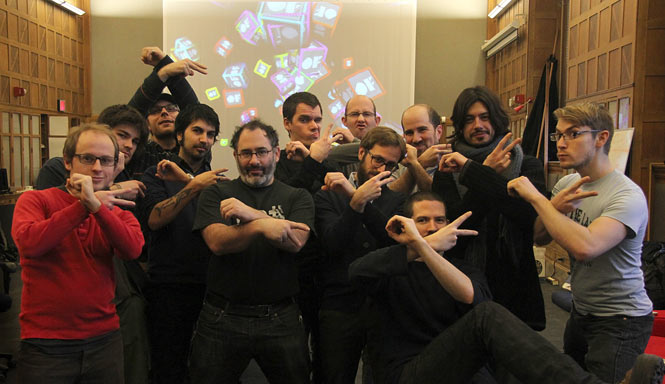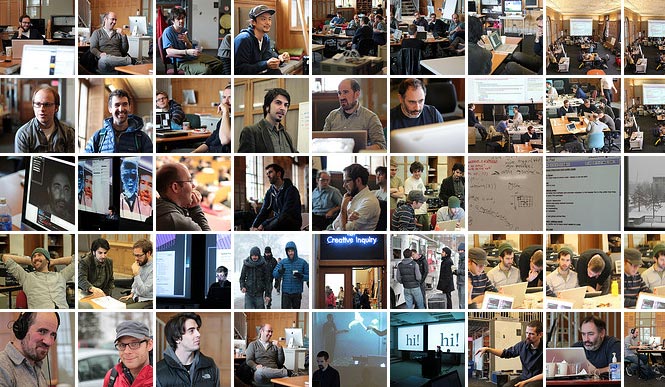A Processing Parser for SubRip Subtitle Files
28 January 2011 / code, pedagogy, referenceIn collaboration with Brazilian new-media artist Pablo Dias, I developed this Processing tool for reading and parsing SubRip files (a popular text file format for movie subtitles). This project was developed with support from the Baltan Laboratories in Eindhoven, Netherlands. The applet is hosted at OpenProcessing and can be downloaded in this zip file.
The project below reads in a SubRip subtitle file for Star Wars, placing each piece of spoken text into its own Subtitle object. It is then possible to search through these for occurrences of certain words, e.g. droid, princess, etc.
The project also contains code to export an edit decision list suitable for use by the coll object in Max/MSP/Jitter. Using this, Pablo created a Max patch which extracted and concatenated all of the video clips in which a certain word was uttered.
In a related demonstration, I combined this SubRip parser with the OpenCloud tag cloud generator to produce a tag cloud visualization of the subtitles in Star Wars.
/**************
This is a Processing parser for .SRT files, a widely used subtitle text file format.
.SRT file information is obtained from: http://en.wikipedia.org/wiki/SubRip
The SubRip file format is "perhaps the most basic of all subtitle formats."
SubRip files are named with the extension .srt,
and contain formatted UTF-8 plain text.
The time format used is hours:minutes:seconds,milliseconds.
The decimal separator used is the comma,
since the program was written in France;
the line break used is the CR+LF pair.
Subtitles are numbered sequentially, starting at 1.
The format for an .SRT subtitle is:
Subtitle number
Start time --> End time
Text of subtitle (one or more lines)
Blank line
These are parsed into a series of SubtitleUnit data structures
and stored in the Java Vector, subtitleVector.
(See class definition for SubtitleUnit below.)
The program includes a method, createExportFileForMaxMSPCollObjectFromCertainWord(),
which exports a text/data file suitable for importing into Max/MSP's "coll" object.
With this, Max/MSP can be directed to extract all of the clips from a movie which
e.g. contain a certain word.
***************/
//-----------------------------------------------------------
// Which .SRT file should we load (from the sketch's "data" folder)?
String srtFilename = "star_wars_iv_a_new_hope.srt";
// Some words to search for in the subtitles.
String searchTerms[] = {
"princess", "planet", "fighter", "droid"
};
//-----------------------------------------------------------
// Important booleans which modify how we will perform the parsing.
boolean bStripItalicChars = true; // Remove and
boolean bStripOtherChars = true; // Remove initial hyphens and ellipses
boolean bStripMusicChars = true; // Remove #, indicating music
boolean bStripStagingChars = false; // Remove brackets [ and ], indicating instructions
boolean bConvertToLowerCase = true; // Convert all subtitles to lowercase
String rawSRTLines[];
int nRawSRTLines;
int nSubtitles;
Vector subtitleVector;
//-----------------------------------------------------------
// Different codes for subtitles.
int SUBTITLE_TYPE_SPEECH = 0;
int SUBTITLE_TYPE_MUSIC = 1;
int SUBTITLE_TYPE_STAGING = 2;
int SUBTITLE_TYPE_ITALIC = 3;
String typeStrs[] = {
"SPEECH", "MUSIC", "STAGING", "ITALIC"
};
//-----------------------------------------------------------
// This class contains a single Subtitle: what was said when.
class SubtitleUnit {
int subtitleNumber;
int subtitleType;
float startTime;
float endTime;
String subtitleText;
void print() {
String typeStr = typeStrs[subtitleType];
println(subtitleNumber + "\t" +
typeStr + "\t" +
startTime + "\t" +
endTime + "\t" +
subtitleText);
}
}
//-----------------------------------------------------------
void setup() {
size(400,210);
noLoop();
subtitleVector = new Vector();
rawSRTLines = loadStrings(srtFilename);
nRawSRTLines = rawSRTLines.length;
if (nRawSRTLines > 0) {
String prevLine = rawSRTLines[0];
String currLine = "";
for (int i=1; i");
if (indexOfArrowChars > -1) {
// if we're here, then currLine is a timecode line, and prevline is an ID line
int subtitleType = SUBTITLE_TYPE_SPEECH;
int subtitleID = Integer.parseInt (prevLine.trim());
String startString = currLine.substring (0, indexOfArrowChars);
String endString = currLine.substring (indexOfArrowChars+4, currLine.length());
startString = startString.trim();
endString = endString.trim();
// Extract and compute the start and end timestamps of the subtitle.
int sH = Integer.parseInt( startString.substring(0,2));
int sM = Integer.parseInt( startString.substring(3,5));
int sS = Integer.parseInt( startString.substring(6,8));
int sL = Integer.parseInt( startString.substring(9,12));
float startTimeInSeconds = 60*60*sH + 60*sM + sS + sL/1000.0;
int eH = Integer.parseInt( endString.substring(0,2));
int eM = Integer.parseInt( endString.substring(3,5));
int eS = Integer.parseInt( endString.substring(6,8));
int eL = Integer.parseInt( endString.substring(9,12));
float endTimeInSeconds = 60*60*eH + 60*eM + eS + eL/1000.0;
// Subtitles might be on several lines. Search ahead to find the end.
String subtitle = "";
int lineNumberToStartFrom = i;
String futureLine = currLine;
while ((lineNumberToStartFrom<(nRawSRTLines-1)) && (futureLine.length() != 0)) {
lineNumberToStartFrom++;
futureLine = rawSRTLines[lineNumberToStartFrom];
subtitle += futureLine + " ";
}
// Cleanup phase: clean the text.
subtitle = subtitle.trim();
if (bConvertToLowerCase) {
subtitle = subtitle.toLowerCase();
}
//----------------------------------------
if (subtitle.startsWith("#")) {
subtitleType = SUBTITLE_TYPE_MUSIC;
}
if (subtitle.startsWith("[")) {
subtitleType = SUBTITLE_TYPE_STAGING;
}
if (subtitle.startsWith("")) {
subtitleType = SUBTITLE_TYPE_ITALIC;
}
//----------------------------------------
if (bStripItalicChars) {
if (subtitle.startsWith("")) {
subtitle = subtitle.substring(3, subtitle.length());
}
if (subtitle.endsWith("")) {
subtitle = subtitle.substring(0, subtitle.length()-4);
}
}
if (bStripOtherChars) {
if (subtitle.startsWith("-")) {
subtitle = subtitle.substring(1, subtitle.length());
}
if (subtitle.startsWith("...")) {
subtitle = subtitle.substring(3, subtitle.length());
}
}
if (bStripMusicChars) {
if (subtitle.startsWith("#")) {
subtitle = subtitle.substring(1, subtitle.length());
}
if (subtitle.endsWith("#")) {
subtitle = subtitle.substring(0, subtitle.length()-1);
}
}
if (bStripStagingChars) {
if (subtitle.startsWith("[")) {
subtitle = subtitle.substring(1, subtitle.length());
}
if (subtitle.endsWith("]")) {
subtitle = subtitle.substring(0, subtitle.length()-1);
}
}
// One more trim for good luck.
subtitle = subtitle.trim();
//----------------------------------------
// Create a new Subtitle containing the above data,
// and append it to the Vector of subtitles.
SubtitleUnit SU = new SubtitleUnit();
SU.subtitleNumber = subtitleID;
SU.subtitleType = subtitleType;
SU.startTime = startTimeInSeconds;
SU.endTime = endTimeInSeconds;
SU.subtitleText = subtitle;
subtitleVector.addElement(SU);
nSubtitles++;
}
prevLine = currLine;
}
}
// Now we have a Vector of dialogue units. Print them out.
printAllSubtitleUnits();
// This is commented out for now, but it works.
// It creates an edit list for MaxMSP of all of the cips containing the word "princess":
// createExportFileForMaxMSPCollObjectFromCertainWord ("princess", false);
}
//=============================================
void draw() {
background (180);
float vSpacing = 40;
float vOffset = 60;
int maxOccasionsOfAnyTerm = 0;
for (int i=0; i maxOccasionsOfAnyTerm) {
maxOccasionsOfAnyTerm = nOccasions;
}
}
fill(0,0,0);
text("SubRip subtitle file: " + srtFilename, 10, 20);
text("Occurrence counts for select words:", 10, 35);
for (int i=0; i -1) {
nTimes++;
}
}
return nTimes;
}
//=============================================
void createExportFileForMaxMSPCollObjectFromCertainWord (
String searchTerm, boolean bAtBeginningOfLineOnly) {
// Exports an output file suitable for input to MaxMSP's "coll" object.
// This object takes data in the following format:
// ID comma space startTime space endTime semicolon
// For example:
// 1, 293.333 298.666;
PrintWriter maxMspOutput;
int nOccasions = 0;
searchTerm = searchTerm.toLowerCase();
String maxMspOutputFilename = srtFilename + "_forMaxMSP_" + searchTerm + ".txt";
maxMspOutput = createWriter(maxMspOutputFilename);
println("Exporting " + maxMspOutputFilename + " for MaxMSP's [coll] object.");
for (int i=0; i -1);
if (bFound) {
String stringForMaxMSP =
SU.subtitleNumber + ", " +
nf(SU.startTime,1,3) + " " +
nf(SU.endTime,1,3) + ";";
maxMspOutput.println (stringForMaxMSP);
println(subtitleText);
nOccasions ++;
}
}
}
println("Output contains " + nOccasions + " occurrences of '" + searchTerm + "'.");
maxMspOutput.flush(); // Writes the remaining data to the file
maxMspOutput.close(); // Finishes the file
}

